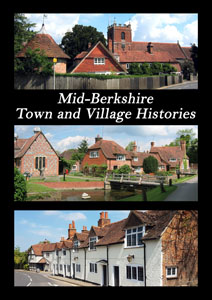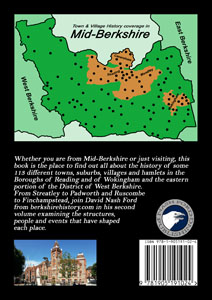 |
 |
||||||||
|
|
Arborfield Lords of the Manor in Literature
Arborfield is essentially an Anglo-Saxon village, the name being originally Edburgefeld meaning Edburga's Field. Edburga was a woman's name. The 'field' was one of several areas of open
land lying in a band across Mid-Berkshire and marking the western boundary of Windsor Forest. It was originally part of the huge parish of
Sonning and as such was owned by the Bishop of Salisbury. The old mill pool supplied him with eels for his dining table Near to the mill, the first church in the parish was a small 13th century wooden chapel-of-ease to the
mother-church at Sonning. The replacement stone building, erected about 1300, is at the
core of what stands today. In the mid-19th century, it was judged unsafe and a new church was built nearer the village in 1863. For many years,
the north aisle remained roofed to house the church's many monuments. Chief of these is the fine renaissance effigial tomb chest to William Standen (died 1637) and his wife. They were almost
certainly the builders of the old manor house known as Arborfield Hall, described by Mary Russell
Mitford (of Three Mile Cross) in the 1820s as the "Old House of Aberleigh" in her classic work, 'Our Village'. A once fine Jacobean mansion, it was by then in a dilapidated state,
open to the elements on one side. The last of the Standen line, Edward - the man who fell for Molly (or Sally) Mogg, the barmaid of literary
fame from the Rose in Wokingham - died without children in 1730. George Dawson eventually took on the hall but was swamped with debts and, in a rash moment,
in the 1820s, he declared "Pull it down" and his steward eagerly obliged. Dawson's son built a replacement many-gabled Neo-Tudor building on the state but this was demolished, in 1956, after
being wrecked by soldiers during the Second World War.
There used to be a number of historic pubs in the village but only one survives as a restaurant. The Bull Inn - once a stop-over for Queen Victoria - is named after the Bullock family who were lords of the manor for several
centuries before the Standens. In the early 16th century, Thomas Bullock was Gentleman Usher Extraordinary to King Henry VIII. The old Swan,
further into the village, is now sadly closed. It was built in 1661 and is supposed to have once played host to King George III. Read more history of Arborfield and other nearby settlements, like Newland, in David Nash Ford's book, 'Mid-Berkshire Town and Village Histories'.
Click to Order direct from the Author. Whether you are
from Mid-Berkshire or just visiting, this book is the place to find
out all about the history of some 113 different towns, suburbs,
villages and hamlets in the Boroughs of Reading and of Wokingham and the eastern portion of the District of West Berkshire.
From Streatley to Padworth and Ruscombe to Finchampstead,
join David Nash Ford from
berkshirehistory.com in his second volume examining the structures, people and events
that have shaped each place. Some of these histories were first
published in part here on this website, but they have all been
considerably expanded and are joined by many new histories of places
often missed by historians, including those which only joined
Berkshire in 1911 or later. Click
for full details and purchase options. |
||||||||
| © Nash Ford Publishing 2001; Revised 2020. All Rights Reserved. | |||||||||





